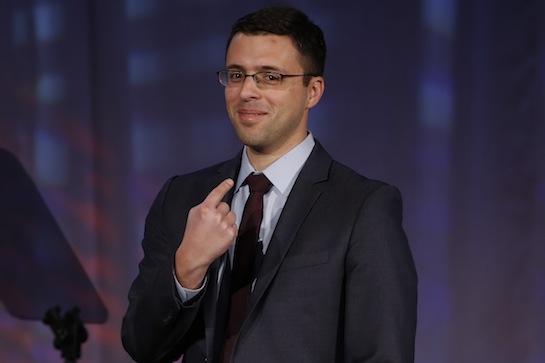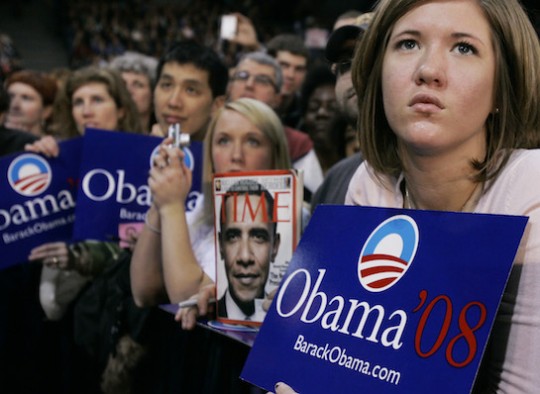VOX DOT DOM explainer-in-chief Ezra Klein is happy to report the millennial generation, which turned out in droves to elect Barack Obama in 2008, is "losing faith in the presidency." That’s good news, he says, in the sense that it might inspire more of them to vote for Democrats in the upcoming midterm election.
According to recent poll, young voters’ trust in the institution of the presidency has dropped from 44 percent to 32 percent since 2010. Klein attributes this to Obama’s inability to live up the cult-inducing hype surrounding his historical presidential run in 2008.
This is a positive development, Klein argues, because at some point Millennials have to realize that solving the world’s problems is going to require more than simply "picking the right charismatic leader, going to the most exciting rallies, and marking a ballot." In other words, hope ≠ change.
Klein explains that, as Obama himself often laments, the president doesn’t have dictatorial powers. It’s Congress that has the most power to "bring change to American politics," which is a shame, because Democrats no longer have complete control of it.
Written in the analytical/explanatory VOX DOT COM style, Klein’s piece is actually just a lament for the good ol’ days of the Democratic supermajority:
Electing the right president is a (probably) necessary but not nearly sufficient condition to bringing change to American politics. The Obama years have been proof of that: in 2009 and 2010, when Obama was working with an overwhelmingly Democratic Congress, he was able to sign more change into law than arguably any president since Lyndon Johnson. Since 2010 and the Republican takeover of Congress, he's gotten almost nothing done. It's not Obama's energy that has flagged, or his agenda that's run dry. It's Congress's interest in that agenda.
That’s one way of putting it. But the Republican "takeover" of Congress wasn’t exactly a Putinesque annexation. Voters chose to return the GOP to power in the House in large part because they didn’t like the "change" coming out of the Democratic Congress, specifically Obamacare. What does it say about a president’s agenda if it requires complete one-party control to implement?
If Millennials are learning that lesson — if they're figuring out that the presidency is oversold in American politics — then that's a very good thing. The first step towards changing American politics is knowing who actually has the power to change American politics. The problem is if they learn that lesson and then simply give up, deciding that if politics can't be changed through the easy, exciting vehicle of the presidency, then it's not worth changing at all.
It’s pretty clear that by "millennials," Klein is really talking about young liberals, who he really hopes will turn out in November to vote for Democrats:
If Millennials are learning that lesson — if they're figuring out that the presidency is oversold in American politics — then that's a very good thing. The first step towards changing American politics is knowing who actually has the power to change American politics. The problem is if they learn that lesson and then simply give up, deciding that if politics can't be changed through the easy, exciting vehicle of the presidency, then it's not worth changing at all.
A recent Washington Post/ABC News poll found that 79 percent of voters over age 65 said they were "certain" to vote in the midterm elections but only 53 percent of voters under 40 said the same. Millennials will never get change they can believe in if they don't turn out to vote for the people who can make that change.
"We are the ones we have been waiting for," Obama said in 2008. Not if we don't show up.
[Vote Democrat in 2014.]
Right on cue, Democrats are preparing a summer push for student loan reform, which is clearly aimed at turning out young voters in November. You can tell that they're super serious about it because Senator Elizabeth Warren (D., Mass.) is expected to play a leading role. Upon analyzing the student loan bill Warren proposed last year, the nonpartisan Brookings Institute said it should be "quickly dismissed as a cheap political gimmick."
Given the way this year’s midterms are shaping up, and the nature of midterm elections in general, devout liberals like Klein are right to be worried. Something to consider: If the success of your political movement is occasionally thwarted because a huge chunk of your base can’t be bothered to vote, what does that say about your movement?
Where are the ones we've been waiting for?

